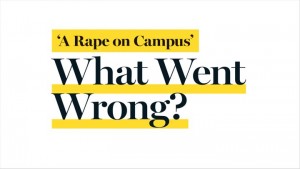In November of 2015, Rolling Stone published a feature about a gang rape that allegedly occurred at a frat party at University of Virginia.
Rolling Stone’s Campus Rape Story was one of the most cautionary tales of confirmation bias in journalism. Journalism website, Poynter, comments that,”It’s also an example of how to not to behave when your organization publishes a disastrous piece of reporting.”
The story prompted the university and people around the country to stop sexual assault on campus. The school even took it far enough to place a temporary ban on all frats.
The story initially catalyzed the university and people around the country to do more to stamp out sexual assault on campus. The school even placed a temporary ban on all frats.
Other news outlets, like The Washington Post, raised details about the account of the Rolling Stones story and the magazine’s failure to do “basic reporting” on such a serioues topic.
Some of the biggest mistakes were made when the writer of the story, Sabrina Rubin Erdely, didn’t contact any of the men she accused of participating in the gang rape or the friends of the accused. The story includes scenes with verbatim dialogue attributed to them.
Managing editor Will Dana then published “A Note to Our Readers” that acknowledged the “discrepancies” in the account of the woman who was allegedly assaulted. Although it didn’t offer any real information about how the story was fact checked, mistakes made or their plans to take action on them.


Leave a response